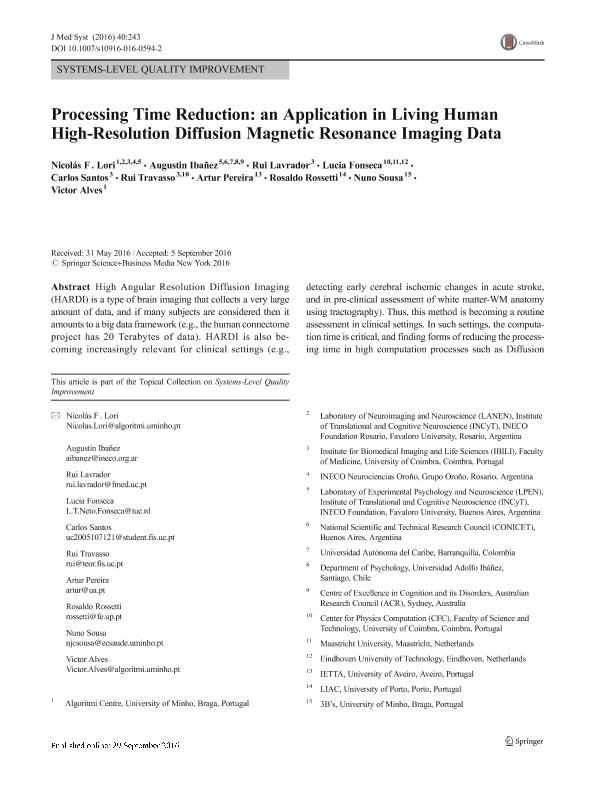Artículo
Processing Time Reduction: an Application in Living Human High-Resolution Diffusion Magnetic Resonance Imaging Data
Lori, Nicolás Francisco; Ibañez, Agustin Mariano ; Lavrador, Rui; Fonseca, Lucia; Santos, Carlos; Travasso, Rui; Pereira, Artur; Rossetti, Rosaldo; Sousa, Nuno; Alves, Victor
; Lavrador, Rui; Fonseca, Lucia; Santos, Carlos; Travasso, Rui; Pereira, Artur; Rossetti, Rosaldo; Sousa, Nuno; Alves, Victor
 ; Lavrador, Rui; Fonseca, Lucia; Santos, Carlos; Travasso, Rui; Pereira, Artur; Rossetti, Rosaldo; Sousa, Nuno; Alves, Victor
; Lavrador, Rui; Fonseca, Lucia; Santos, Carlos; Travasso, Rui; Pereira, Artur; Rossetti, Rosaldo; Sousa, Nuno; Alves, Victor
Fecha de publicación:
11/2016
Editorial:
Springer
Revista:
Journal Of Medical Systems
ISSN:
0148-5598
e-ISSN:
1573-689X
Idioma:
Inglés
Tipo de recurso:
Artículo publicado
Clasificación temática:
Resumen
High Angular Resolution Diffusion Imaging (HARDI) is a type of brain imaging that collects a very large amount of data, and if many subjects are considered then it amounts to a big data framework (e.g., the human connectome project has 20 Terabytes of data). HARDI is also becoming increasingly relevant for clinical settings (e.g., detecting early cerebral ischemic changes in acute stroke, and in pre-clinical assessment of white matter-WM anatomy using tractography). Thus, this method is becoming a routine assessment in clinical settings. In such settings, the computation time is critical, and finding forms of reducing the processing time in high computation processes such as Diffusion Spectrum Imaging (DSI), a form of HARDI data, is very relevant to increase data-processing speed. Here we analyze a method for reducing the computation time of the dMRI-based axonal orientation distribution function h by using Monte Carlo sampling-based methods for voxel selection. Results evidenced a robust reduction in required data sampling of about 50 % without losing signal’s quality. Moreover, we show that the convergence to the correct value in this type of Monte Carlo HARDI/DSI data-processing has a linear improvement in data-processing speed of the ODF determination. Although further improvements are needed, our results represent a promissory step for future processing time reduction in big data.
Archivos asociados
Licencia
Identificadores
Colecciones
Articulos(OCA HOUSSAY)
Articulos de OFICINA DE COORDINACION ADMINISTRATIVA HOUSSAY
Articulos de OFICINA DE COORDINACION ADMINISTRATIVA HOUSSAY
Citación
Lori, Nicolás Francisco; Ibañez, Agustin Mariano; Lavrador, Rui; Fonseca, Lucia; Santos, Carlos; et al.; Processing Time Reduction: an Application in Living Human High-Resolution Diffusion Magnetic Resonance Imaging Data; Springer; Journal Of Medical Systems; 40; 11; 11-2016; 1-8
Compartir
Altmétricas



